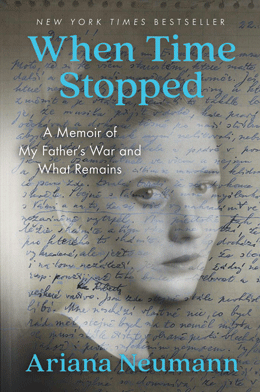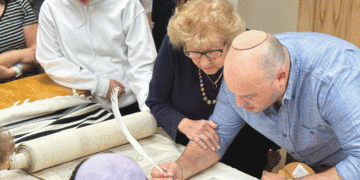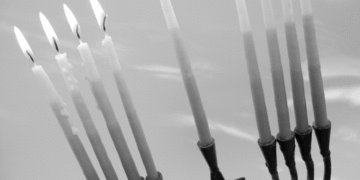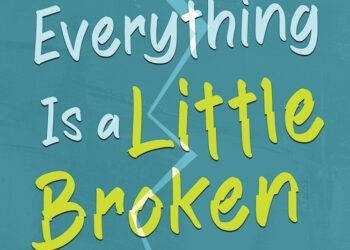Reviewed by NEAL GENDLER
Hans Neumann, a young Czech sought by the Gestapo for failing to report for deportation, chose an unusual place to hide: Berlin.
As Jan Šebesta, 22, his photo glued on the altered ID of his girlfriend, Míla Svatonová, and carrying the passport of his closest friend, Zdeněk Tůma, Neumann traveled to Berlin to work with Zdeněk at a plant making industrial lacquer for Luftwaffe aircraft.
It was a daring, brazen idea.
“No one on the run would go there to hide,” says his daughter, Ariana Neumann, author of When Time Stopped. Employed in the heart of Nazi Germany, in May 1943, “he would hide in plain sight.”
But Neumann never told this to Ariana. He almost entirely refused to speak of the Shoah, his extended Czech family — only five of 29 Jews survived — and his wartime experiences.
Postwar, he and brother Lotar—saved mostly by being married to gentile Zdenka—moved to Venezuela and recreated their dead father’s paint-making business, called Montana. They built a conglomerate. Hans became a twice-married and divorced philanthropist, intellectual, arts patron and leading industrialist, with a hobby of collecting and repairing pocket watches. He owned 297.
“My father never said he was Jewish,” says nun-taught Ariana. Whether he said so before the war, “he certainly never said it afterward.” She’s uncertain “whether this arose from some philosophical conviction, fear or a deeper trauma.”
Ariana, who has “no formal religious leanings,” was born to Hans’ second wife, Maria Cristina, so “impossibly beautiful” that people on the street would stare. That, and her father’s prominence, made young Ariana uncomfortable.
Perhaps that compounded the shock when a fellow Tufts freshman told her that a Neumann in Venezuela certainly must be Jewish. She phoned her father, who angrily confirmed it and hung up.
As a child, she’d found a box with Hans’ fake ID and a few German documents. The box quickly was hidden and she learned little else while he lived. Time is two stories entwined: Hans’ hidden history and Ariana’s quest to learn it, starting with that same box, left fully crammed. “It was clear that this was his way of showing me who he had been,” she says.
“My father left the world of which he seldom spoke as a riddle for me to unlock… if I ever was going to understand him,” she says.
Seeking the key, Ariana traveled widely, seeing the places he’d lived; visiting Terezin, the ghetto near Prague where Hans’ parents had been imprisoned, and interviewing survivors of that time and their children. She learned stories she’d never heard and saw photos she’d never seen. One interviewee was Tůma’s son. Hans had mentioned life-risking, loyal Zdeněk to her only once, and barely.
“Zdeněk was otherwise consigned to that silent space where my father kept his memories,” she says.
But the box now held a jewel: Hans’ secretly written memoir of sanity-straining days hiding behind a wall in Prague — “when time stopped” — and his working and firefighting in Berlin under bombs. It is a fascinating account of a once-careless young man’s sudden focus and tremendous luck. Ariana wisely stands mostly aside and lets us read verbatim.
Always in danger of discovery, “Jan” had advantages: He was a chemistry graduate, clever and, like Lotar, uncircumcised.
The other hero in this story is Zdenka Neumann, Lotar’s wealthy, talented, wartime wife. Correspondence Ariana saw described Zdenka glowingly, yet “nobody had ever mentioned Zdenka to me.”
Zdenka and the Neumanns were utterly devoted. A journalist, trained as a lawyer, competent at almost anything, seemingly afraid of nothing, she and Lotar sent his imprisoned parents supplies through two intermediaries, the second a laundress who concealed them in a wheelbarrow and brought out the parents’ letters, a few of which are translated.
Astonishingly, Zdenka sneaked into Terezin with a Jewish women’s work crew to resupply, comfort and encourage them. Twice.
When Lotar’s paint-plant job and intermarriage no longer protected him from deportation, Zdenka kept him hidden, moving among apartments she owned.
When Time Stopped is a gem, amplified by photos and a helpful family tree but, alas, no index.
Hans had destroyed most of his files, Ariana says, but “surrendered evidence of his life,” the past she’d been forbidden to ask.
“Often I have felt that it was more than just permission,” she says. “At times, it seemed almost an exhortation.”
***
Neal Gendler is a Minneapolis writer and editor.



















